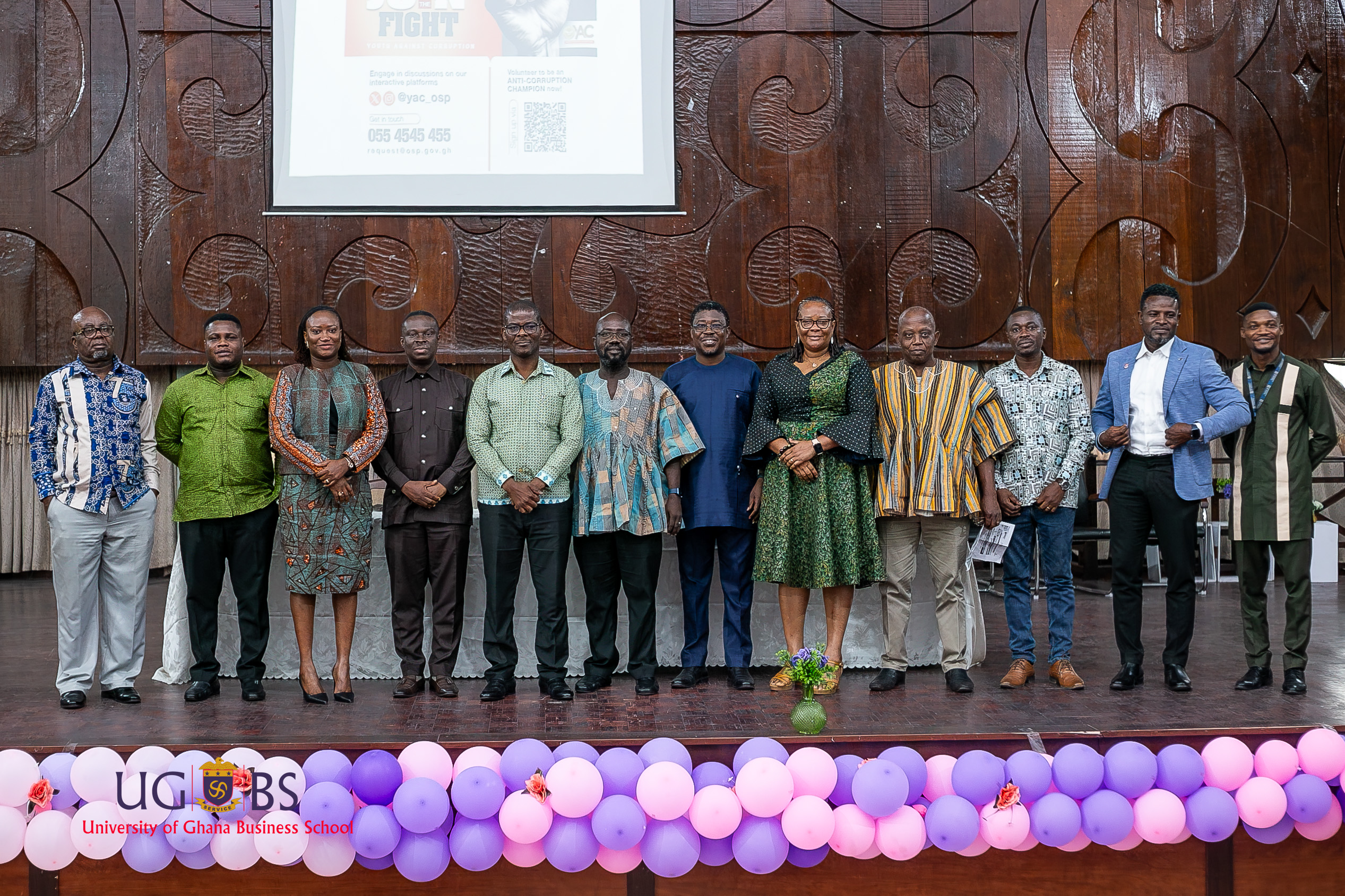
UGBS Organises Ethical Leadership Conference for Student Leaders
The University of Ghana Business School (UGBS) organised a one-day Ethical Leadership Conference on 7th February 2025 at the R. S. Amegashie Auditorium. The conference was themed “Empowering Tomorrow’s Leaders: Ethics as the Foundation of Leadership”. It was an initiative of Prof. Justice N. Bawole, Dean of UGBS, and was sponsored by the Education Collaborative. The event brought together students, faculty, and staff from various tertiary institutions across Ghana and representatives from the Youth Bridge Foundation, the Association of Ghana Industries, and the Office of the Special Prosecutor. Dr. Saviour A. Nubuor, a Senior Lecturer at UGBS, moderated the programme.
Delivering the welcome address, Prof. Bawole stated that the programme was specifically organised for student leaders hoping to instil ethical values in them. He highlighted certain irresponsible student actions that breach university rules and emphasised that the conference was meant to nurture ethical leadership among young adults. “We are here to have important conversations on leadership, ethics, and accountability so that our student leaders can become the kind of future leaders this country needs,” he said. He expressed hope that the conference would grow into a larger platform for building ethical leaders.
The Chairperson for the conference, Prof. Tweneboah Koduah, who is also a professor of social marketing at UGBS stressed that every leader must uphold ethics. He encouraged participants to take the discussions seriously, warning that the lack of trust in today’s workforce has led business owners to hire expatriates over locals. “If we do not work on our trustworthiness, we will continue to lose opportunities that should benefit our citizens,” he cautioned.
Mr. Frank Yaovi Lawoe, Chief Risk Officer at Republic Bank served as the Keynote Speaker. He spoke about why ethics matter in leadership today: Imperatives of the Ghanaian employee. He defined ethical leadership as “caring about everyone and everything, rather than just what is convenient.” He noted that ethics form the very foundation of every society, company, or group. He cautioned against unethical practices like employee fraud in banks, which often lead to job losses, imprisonment, and family crises. “The effects of unethical behaviour cannot be overlooked,” he said, adding that ethics ensure long-term success and inclusive development. He advised that “organisations must establish core values, train employees, and create environments where unethical behaviours can be identified and addressed”.
Prof. Kwasi Dartey-Baah, Professor of Leadership and Director at Institutional Advancement, UG, had a presentation on “Understanding Ethical Leadership: Principles and Traits”. He described leadership as an interpersonal influence and explained the role of morality and culture in shaping ethical leaders. “Ethical leadership is about making decisions that benefit the larger society, not just what is easy or convenient,” he stated. He used Moore’s 2021 Framework to explain how ethical leadership improves organisational performance, brand image, and employee well-being. He also advised against unethical behaviours such as academic cheating, plagiarism, peer pressure, social media misuse, and substance abuse. “When you are unethical, it affects your mental health, peace, and social life,” he warned. He further explained that morality is more of personal beliefs that complement ethics to guide a society.
A panel discussion featured Dr. Kojo Pumpuni Asante, Director of Advocacy and Policy Engagement at CDD-Ghana; Mr. Manasseh Azure Awuni, award-winning investigative journalist; Mrs. Mary Awelana Addah, Executive Director of Ghana Integrity Initiative, and Mr. Daniel Domelevo, former Auditor-General of Ghana to discuss “Giving Voice to Value – Building Confidence to Act Ethically”.
Mr. Awuni advocated for ethics to be integrated into university curricula, emphasising its importance for student leaders. He added that the youth of today are not being groomed as leaders for tomorrow, looking at the current situation. “The President has given more attention to youth now, and I hope they use it well,” he said. He shared his experience of rejecting political job offers to maintain journalistic independence, stating that “Success is not about cutting corners, in due time everything pays off.”
He condemned unethical practices such as young people taking loans to bribe their way into security services, describing it as a serious national issue. He also referenced the recent SHS School Placement Saga, where placements were allegedly sold for bribes, as an example of unethical behaviour in the country. Mr. Awuni assured participants that “Leadership success is not about being political; it’s about prioritising students’ interests over personal ambitions.” He encouraged students to have personal life principles and choose the right role models. “Ethical leadership may come with a high price, but in the long run, it is rewarding.” He encouraged.
Mrs. Addah advised students to avoid situations or places that could lead to corruption. She shared an example of a regional administrator who remained ethical throughout his career and later reaped great rewards in retirement. “There is no greater benefit than knowing no one will chase you for corruption in your old age,” she said. She further urged universities to strengthen orientation programmes to ensure students are well-informed about institutional policies and codes of conduct. According to her, there is a space for everyone to contribute to national development and the way out is to be ethically upright “Ethics should not only be practised when sanctions are in place; it should be a way of life,” she added.
Mr. Domelevo criticised Ghanaian society for glorifying wealth without questioning its source. “We must criticise unethical behaviours publicly, not just be ethical in private,” he urged. He encouraged students to seek and pursue opportunities, advancements, or successes based on their abilities, skills, and hard work rather than trying to achieve them through unfair, dishonest, or easy means. He added that some people also push officials to take bribes as a form of appreciation “It is their job, so you don’t have to give them anything for performing their responsibilities” he said. “Being ethical may not bring instant wealth, but it will bring lasting opportunities for the whole society and your generation.” He assured. He recommended that universities observe and address unconscious behaviours that students may emulate, while also providing guidance to government officials on understanding the systems that drive national development.
Dr. Pumpuni Asante stressed the need for universities to regulate student elections to prevent excessive spending during campaigns, which often leads to corrupt practices after they gain power. He mentioned that students need such skill sets about ethical leadership before they graduate “If we do not check these unethical behaviours in student leadership, they will be carried into national politics,” he cautioned. He also advocated for establishing ethical leadership communities in universities to support students in making the right decisions even after graduation.
Ms. Rose A. Dodd, Executive Director of the Education Collaborative also gave remarks about leading with integrity and ethics. She reiterated the organisation’s mission to engage African institutions in leadership and ethics development to connect, learn and share the different ways of transforming areas of common interest. She encouraged participants to reflect on the conference’s impact on their personal and professional growth. Some members of the Education Collaborative were also present.
A team from the Office of the Special Prosecutor provided insights on corruption prevention and the legal consequences of unethical behaviour, stating that such engagements help prevent corruption. Participants were also enlightened on the legal consequences of unethical behaviour. In his closing remarks, Prof. Bawole reinforced the key message of the conference, “You can live an ethical life and still be successful. Whatever position you hold in life, do your very best.” Participants were awarded certificates and provided an interactive platform to gain insights from seasoned professionals, equipping them with the knowledge and motivation to uphold ethical leadership in their respective fields.

Story by Gladys Mensah, UGBS Marcomms
Edited by Doris Koffi, UGBS Marcomms